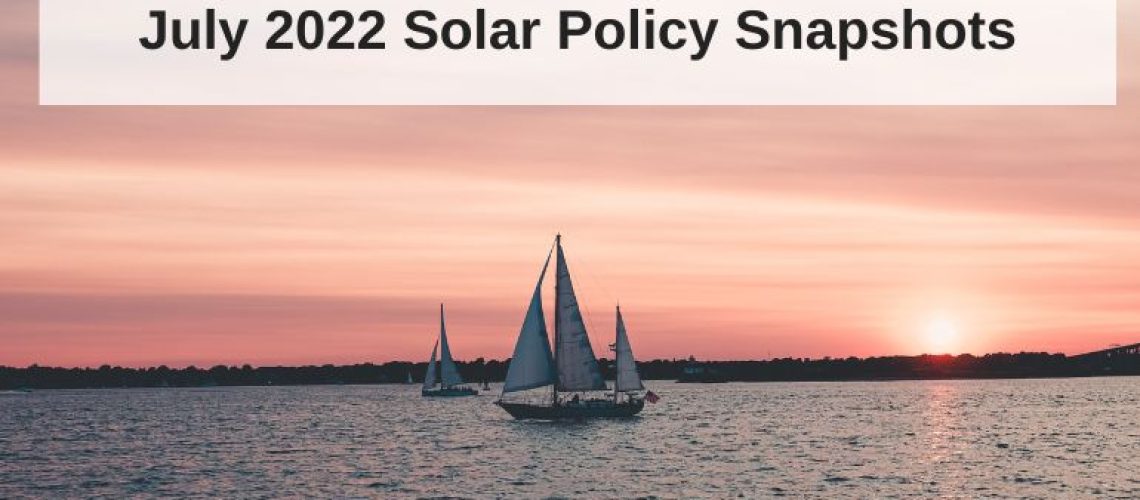
Rhode Island officially has the most aggressive renewable energy plan in the nation thanks to a new law.
Illinois rule changes will simplify solar + storage interconnection
Springfield, Illinois
The Illinois Commerce Commission recently revised the state’s rules regarding how solar and other DERs connect to the distribution grid. The changes will reduce the time and cost to interconnect and make it easier to use energy storage to balance intermittent resources.
New Jersey grants will help 46 communities make clean energy plans
Trenton, New Jersey
The New Jersey Board of Public Utilities approved grants for 46 municipalities to create community energy plans to help the state reach its goal of 100% clean energy by 2050. The program encourages communities to prioritize renewable energy and equitable access.
Solar execs lobby Congress for ITC extension, domestic manufacturing credits
Washington, D.C.
SEIA board members went on a lobbying trip to Congress to ask leaders to pass critical clean energy policies in budget reconciliation legislation. The executives focused on the need for a long-term extension of the ITC as well as domestic solar manufacturing credits.
Advocates say solar industry will take a hit from Supreme Court EPA decision
Washington, D.C.
On June 30, the Supreme Court issued a decision in West Virginia v. Environmental Protection Agency (EPA) that will constrain the EPA’s ability to regulate greenhouse gas emissions from power plants. Solar advocates said this will slow deployment, but underscored the importance of prioritizing state-level advocacy for renewable advancement.
FERC proposes utility interconnection deadlines, penalties for noncompliance
Washington, D.C.
The Federal Energy Regulatory Commission clear interconnection backlogs meant to clear interconnection backlogs and speed clean energy deployment, including utility deadlines and penalties for noncompliance. SEIA said the proposed rules closely follow recommendations the group and its partners submitted in February.
Governor signs Rhode Island 100% renewables bill
Providence, Rhode Island
Gov. Daniel McKee signed into law the most ambitious renewable transition bill in the country, setting a target for Rhode Island to reach 100% renewable energy by 2033. The transition time is designed to allow for the necessary expansion of capacity.
Solar net metering on track to end in Indiana
Indianapolis, Indiana
After a 2017 bill set the stage for the change, new solar customers in Indiana starting July 2022 will not be receiving 1:1 net-metering credits for their solar installations. The state’s investor-owned utilities will instead be using an “Excess Distributed Generation” policy that advocates say credits new solar customers at a lower rate for the extra electricity they generate.
California Energy Commission to give grants to cities, counties that adopt SolarAPP+
Sacramento, California
The California Energy Commission is starting a major push to encourage cities and counties to adopt the Dept. of Energy’s SolarAPP+ automated solar permitting software. To help with administrative costs in the transition, the CEC is offering maximum grants of $40,000 to $100,000.
New interconnection ruling in California should connect solar to grid quicker
Sacramento, California
The California Public Utilities Commission recently made a decision that will simplify interconnection for distributed resources like solar and storage. The state will increase transparency and allow developers to identify preferable locations for projects by sharing hosting capacity data.
NC Supreme Court rules that HOAs cannot deny homeowners from installing solar
Raleigh, North Carolina
The Supreme Court of North Carolina issued an order in a case between a homeowner and homeowner’s association (HOA) that affirmed the state law protecting the right to install rooftop solar. The court held that HOA provisions granting broad discretionary authority to architectural review committees cannot be used to prohibit solar panels.
Vermont utility commission slightly adjusts solar net-metering rates
Montpelier, Vermont
The Vermont Public Utility Commission issued its bi-yearly net-metering update that will increase compensation for most existing net-metered systems, but slightly decrease compensation for applications on or after Sept. 1. The commission said the changes will better moderate the pace of new net-metering development.



